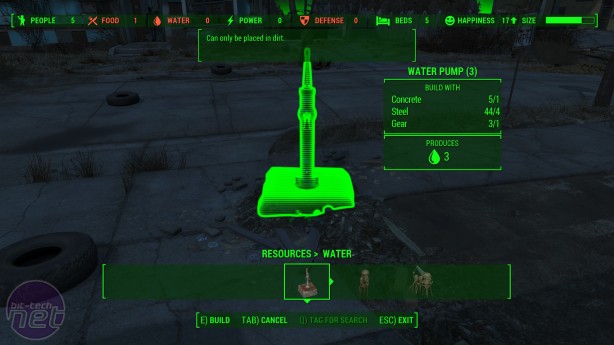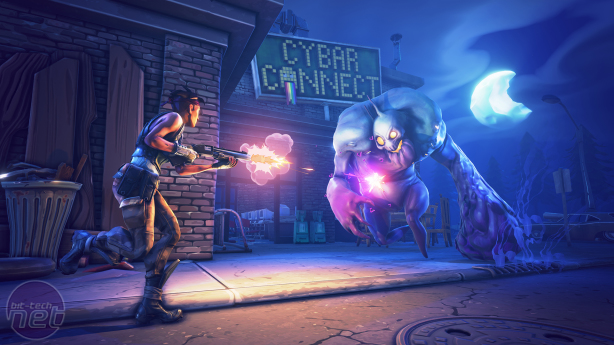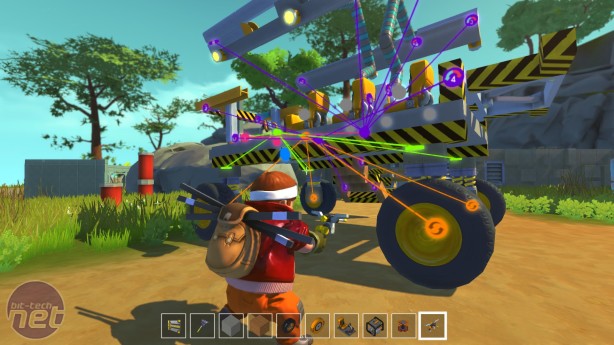
Why is this a problem? To begin with, it's disingenuous - it's selling the promise of crafting without actually offering the potential for creativity. It's an easy way of making a game appear to have more content than it actually does. Lastly, it's taking this idea of being creative and constructive and using it to sell games which tread the same destructive path as so many before them. Again, I don't have a problem with such games, but taking a game about killing and death and marketing it on the basis that it has crafting like Minecraft is rather unpalatable. Sure, Minecraft has combat in it too, but it's hardly on the level of something like Far Cry.
A bigger issue is because the industry has collectively decided that this is the standard template for crafting in games, it means they fail to actually explore the ideas that make Minecraft so unique and successful. Unlike those other games, Minecraft offers no instruction about what you can craft. Instead, it requires the player to assemble tools and items out of component parts according to a fairly consistent logic. When you figure this system out, it's a fantastic moment of discovery, and you can then experiment with that system, following the logic to discover new tools and items.
What's more, this is only the most basic tier of Minecraft's crafting system. From the basics introduced by the crafting table, you can go on to construct houses, castles, rail networks, complex electronic circuits. Hell, you can build functioning computers inside Minecraft. Crafting here is a method through which players open up a world of creativity, not a tiered system of upgrades for their gun.
I'm not saying that every game with crafting in it needs to be like Minecraft. Not least, Minecraft has a massive advantage over most games in that its world is comprised out of LEGO-style blocks, and creating such a versatile system in a game that uses more standard environment design is much harder. But if a crafting system is going to be included in a game, it does needs to be creative in some way. Both the resources and the objects you create need to have a tangible presence in the world. Otherwise, you're just smashing abstract concepts together to make slightly different abstract concepts, which is great if you're a professor of Philosophy, but less useful for building your virtual house.
It is possible to achieve, too. Fallout 4's crafting system, for example, goes considerably further than most, allowing the player to construct some pretty impressive buildings out of scrap. It even lets you build functioning electricity grids, which is great. I don't think it's a superb example of crafting, because the UI is extremely clunky and you can only build in designated areas, but it's probably the best instance of creative construction from a major developer. Epic Games' upcoming Fortnite also looks to have an in-depth system for constructing buildings, although it appears to have swerved toward a greater emphasis on MMO-style zombie shooting.
More promising is Scrap Mechanic, a cheery open-world crafter with an emphasis on building machines and contraptions. It's still in (very) Early Access, but in terms of ideas, at least, it successfully grasps the idea that crafting should encourage ingenuity and invention. In short, to make a successful crafting system, it needs to be creative within itself, and enable the player to get creative with the game in question. Otherwise, it's just a fancy word for "upgrade".
A bigger issue is because the industry has collectively decided that this is the standard template for crafting in games, it means they fail to actually explore the ideas that make Minecraft so unique and successful. Unlike those other games, Minecraft offers no instruction about what you can craft. Instead, it requires the player to assemble tools and items out of component parts according to a fairly consistent logic. When you figure this system out, it's a fantastic moment of discovery, and you can then experiment with that system, following the logic to discover new tools and items.
What's more, this is only the most basic tier of Minecraft's crafting system. From the basics introduced by the crafting table, you can go on to construct houses, castles, rail networks, complex electronic circuits. Hell, you can build functioning computers inside Minecraft. Crafting here is a method through which players open up a world of creativity, not a tiered system of upgrades for their gun.
I'm not saying that every game with crafting in it needs to be like Minecraft. Not least, Minecraft has a massive advantage over most games in that its world is comprised out of LEGO-style blocks, and creating such a versatile system in a game that uses more standard environment design is much harder. But if a crafting system is going to be included in a game, it does needs to be creative in some way. Both the resources and the objects you create need to have a tangible presence in the world. Otherwise, you're just smashing abstract concepts together to make slightly different abstract concepts, which is great if you're a professor of Philosophy, but less useful for building your virtual house.
It is possible to achieve, too. Fallout 4's crafting system, for example, goes considerably further than most, allowing the player to construct some pretty impressive buildings out of scrap. It even lets you build functioning electricity grids, which is great. I don't think it's a superb example of crafting, because the UI is extremely clunky and you can only build in designated areas, but it's probably the best instance of creative construction from a major developer. Epic Games' upcoming Fortnite also looks to have an in-depth system for constructing buildings, although it appears to have swerved toward a greater emphasis on MMO-style zombie shooting.
More promising is Scrap Mechanic, a cheery open-world crafter with an emphasis on building machines and contraptions. It's still in (very) Early Access, but in terms of ideas, at least, it successfully grasps the idea that crafting should encourage ingenuity and invention. In short, to make a successful crafting system, it needs to be creative within itself, and enable the player to get creative with the game in question. Otherwise, it's just a fancy word for "upgrade".

MSI MPG Velox 100R Chassis Review
October 14 2021 | 15:04












Want to comment? Please log in.